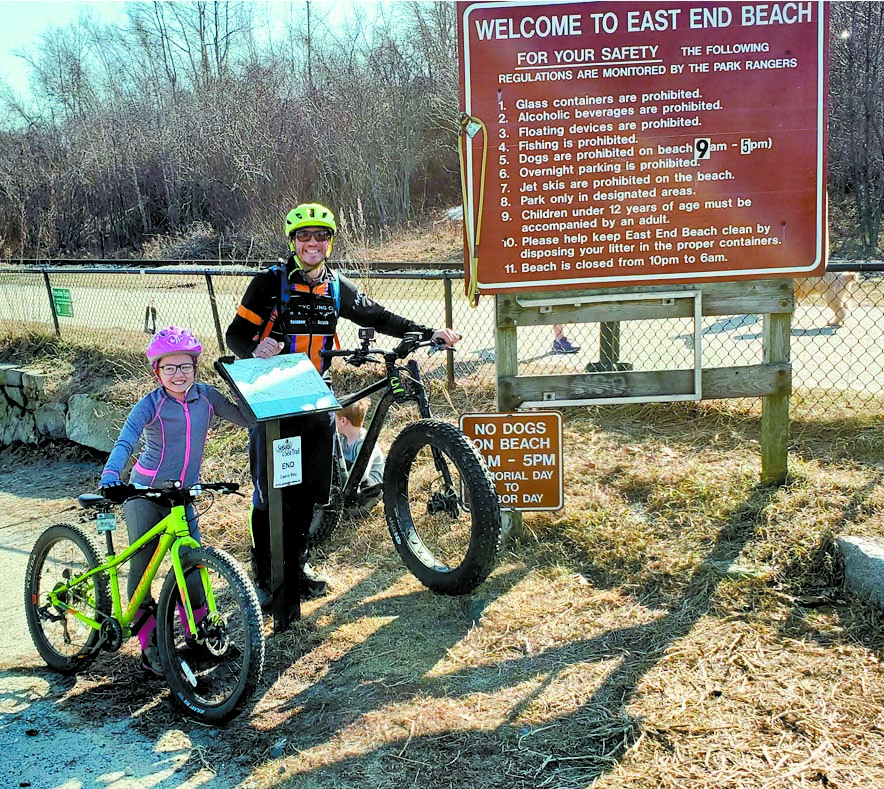Pedaling for a Cause: Cyclist looks to draw attention to water protection

By Wayne E. Rivet
Staff Writer
As Jeremy Chapman was hiking a beautiful 100-mile section of the Appalachian Trail, he became concerned about being able to access clean drinking water.
“The ridges were dry and getting water was a real concern, as it involved a very steep hike down off the ridge and then back up again to get back to the main trail,” the Hebron resident said. “Being worried that I would not be able to access clean water and be stuck dehydrated made an impact upon my day and activity. Then, I considered that this is how life is for a significant portion of the world’s peoples.”
Access to clean drinking water is an afterthought for many — until faced with a critical moment, as Chapman encountered.
To raise awareness about the importance of protecting our water resource, as well as help others across the globe gain access, Chapman decided to combine his love of the outdoors and a cause.
He recently completed his SnowBridges fatbike project — a 100-plus mile ride along snow-covered trails starting at the New Hampshire border on Feb. 29, cycling through Bridgton (he stayed a night at the Noble House Inn), past Sebago Lake, pedaling through Standish, South Windham, Gorham and Westbrook, ultimately concluding the ride near a large water treatment facility at Portland’s East End Beach on Tuesday, March 3.
On that last day, Chapman was joined by his daughter, Annabelle.
“I arranged the itinerary for her to participate in this ride with me. She had not ridden her bike since last year, so the 9.3 miles that included icy single-track was not easy for her, but she made it and I am proud of her,” said Chapman, who is president of Chapman Real Estate Development, LLC in Lewiston. “The planet as a whole is my concern.”
On a global front, Chapman set a goal to raise $4,000 for The Water Project (a U.S.-based charitable organization, TheWaterProject.org), which assists a community in Africa to provide clean, safe and reliable water to its people.
“Today, too many children suffer needlessly — walking miles for dirty water that makes them sick,” Chapman wrote on his website. “You and I can change that, please make a donation and help me spread the word.”
To make a donation, go to: https://lnkd.in/eZp-ZnD
On the awareness front, Chapman used today’s technology to “livestream” his journey on trails cutting through wooded sections. Chapman created a route that followed the “water cycle along a large concentration of our water aquifers” and highlighted the “beautiful natural landscape and our impressive heritage of recreational snow trails.”
“During the ride, I enjoyed the scenery and the feeling of adventure that comes with doing something new. Some of my challenges were staying upright on the predominantly icy surfaces, but it was also to my advantage as the harder surfaces had little rolling resistance, and I was able to make excellent time,” he said. “Some other lesser challenges were out sprinting three different dogs, keeping my electronics and cameras working in the cold, and some crazy stream crossings situations!”
A fatbike was the perfect means of travel. “Fatbikes can roll just fine over frequent ground sections that snowmobiles and cross-country skis have a hard time with. In this manner, fatbikes can enjoy a wider variety of trail conditions than much of the current user base of these trails,” he added. “I bought the fatbike two winters ago as I started to do less snow plowing and needed a stress relief outlet. I grew up being outside all winter long teaching skiing and snowboarding for many years at Lost Valley in Auburn, and I missed having a sport to get me through the Maine winters. My fatbike served this need and I quickly became an enthusiast.”
While the ride was taxing at times, Chapman was back in a place he has always found comfort and magical — the woods.
“I grew up playing and riding bikes and skateboards with the neighborhood children, but some of my best friends growing up were the woods and my own imagination. I am not sure if I have ever been in a place so magical as the woods around my house growing up. They were not the wildest, nor most beautiful, but for the period of my young life, they were many worlds to me and my solace,” said Chapman, who earned a Sociology degree and a minor in computer science in Virginia, and moved back to Maine in 2007 to start a landscaping business.
So, what’s next? More “athletic adventures” to raise awareness for clean water and other pressing environmental concerns here in Maine.
“It has since dawned on me that I cannot get people to care for the issues and problems of others in far-away lands if they do not realize that they need to take care of their own bodies and the environment of our own local towns and state,” he said. “This was moment of clarity and I will now focus on healing myself and those around me first, before we can truly have the intention of helping others in far-away lands.”


